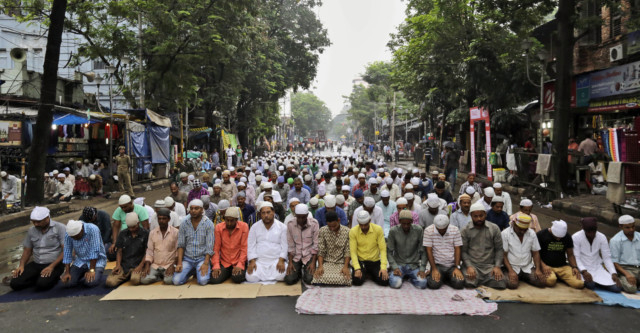
Is the Congress party, after its recent resounding defeat, lumbering towards a new stance on secularism — a touchstone for its founding fathers? When one of its stalwarts, former defence minister A.K. Antony, pleads for a reset, it would appear that India’s grand old party is gradually waking up from deep slumber. This debate also needs to be seen in the context of the broader question, namely: Is secularism in crisis, and not just in India?
Kenan Malek in his book From Fatwa to Jihad examines multiculturalism as practised in the United Kingdom and parallels can be drawn with the Indian experience, especially with regard to what is derisively termed as pseudo-secularism; a charge routinely made against the Congress and to which Antony drew the attention of his party. The dark underbelly of multiculturalism in the UK has helped to foster a tribal nation and echoes of this can be found in India as well. The word secularism in the Indian context has a distinctly different meaning as compared to the rest of the world. Elsewhere, it is used simply to define the separation of Church from affairs of the state whereas in India, it means equal treatment for all religions. Similarly, multiculturalism in the UK has overtones of naturalisation of immigrants along with expanding the limits of tolerance in a liberal society. But India’s concept of unity in diversity is more profound.
The Bharatiya Janata Party’s (BJP) historical grouse has been that appeasement of minorities has come at the expense of the majority, while the Congress has fervently believed — despite such accusations — that the minorities need affirmative action. Is that about to change now that Antony has spoken? Indeed, he claims the party’s precipitous fall from grace is because it is seen as anti-Hindu. It is almost heretical for a Nehruite and a hardcore Congress man to concede this!
After the partition of 1947, the Hindu–Muslim divide in India enjoyed an eerie quietude, despite periodic outbursts of violence until the Babri Masjid movement of 1984. Post the demolition of the mosque in 1992, the rift took a far edgier tone. Majoritarianism began its slow move towards wider acceptance and the rise of the BJP is rooted in this period. Some may claim it started with former prime minister, late Rajiv Gandhi: He backtracked on the infamous Shah Bano case and unlocked the mosque in 1985. Irrespective of these differing explanations for the surge of the Hindu right and the gradual mainstreaming of some of its polarising stances on the uniform civil code and defanging of the Sharia courts, the rising tide of majoritarianism was fuelled by the Congress’s persistent use of vote-bank politics. The perception that the party is anti-Hindu simply got stronger. Sadly, it is now between a rock and a hard place, for Muslims are also increasingly forsaking the party.
While Congress’s cynical approach is the more proximate reason for Hindu revivalism, the Babri Masjid movement, which triggered this revivalism, is actually birthed in a much more deep-seated historical grievance. This is ironical since it is a majority holding a grievance against a minority. Hindus demographically far outstrip Muslim citizens of India; Hindus account for about 80 per cent of the population of India, while Muslims constitute about 14 per cent. Consequently, it is incongruous for such majoritarianism to thrive on some ancient accusations.
What is this grouse?
At a superficial level, the dispute is one of whether a temple existed at the site before the mosque was constructed. However, there is a more layered despair and hurt that feeds it. The BJP and groups like Rashtriya Swayamsevak Sangh have fed this antediluvian notion that despite some early Muslim invaders wantonly desecrating sacred Hindu temples, there has never been an adequate acknowledgment of this wrongdoing by independent India’s Muslim citizens; alleged sins committed by their forefathers to be expiated by generations that were born much later. Indeed, some of the exhortations as the Babri Majid was brought down echo a battle cry. The footage of those grim moments in India’s recent history when replayed shows an exultant crowd celebrating a famous “victory”.
Selective reading of history and crude reductionisms spawn real and imaginary grievances. This combined with Congress party’s vote-bank politics is the very snake oil that has fired up this resurgent majoritarianism, which the BJP has so cleverly harnessed. It is a different matter that Narendra Modi, at the hustings and after, has studiously kept away from these outdated grumbles and focused on development, fighting corruption and providing better governance. He did not need the communal (sectarian) card; the Congress had done it for him.
The so-called Nehruvian consensus consisted of taking an indulgent view of Muslim sensitivities and this broad sentiment continued under former prime minister Atal Bihari Vajpayee’s era as well. But the Modi government is unlikely to follow the same path. It does not have to. Antony’s entreaties to his party effectively spell the end of that consensus. The Liberal pivot is indeed challenging the country’s Muslims to think afresh. However, the horrific anti-Muslim riots in Gujarat in 2002 and the recent dreadful incidents in Uttar Pradesh make such avowals insensitive and morally indefensible. Kenan’s book gives us a glimpse of the alternative — the depressing side effects of multiculturalism and a dependence on special rights. India does not need a Bradford; a grey town in the hills of Yorkshire!
Ravi Menon is a Dubai-based writer, working on a series of essays on India and on a public service initiative called India Talks.








